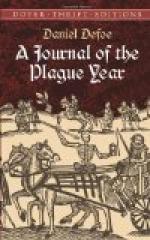It is to be noted here that the dead-carts in the city were not confined to particular parishes, but one cart went through several parishes, according as the number of dead presented; nor were they tied to carry the dead to their respective parishes, but many of the dead taken up in the city were carried to the burying-ground in the out-parts for want of room.
I have already mentioned the surprise that this judgement was at first among the people. I must be allowed to give some of my observations on the more serious and religious part. Surely never city, at least of this bulk and magnitude, was taken in a condition so perfectly unprepared for such a dreadful visitation, whether I am to speak of the civil preparations or religious. They were, indeed, as if they had had no warning, no expectation, no apprehensions, and consequently the least provision imaginable was made for it in a public way. For example, the Lord Mayor and sheriffs had made no provision as magistrates for the regulations which were to be observed. They had gone into no measures for relief of the poor. The citizens had no public magazines or storehouses for corn or meal for the subsistence of the poor, which if they had provided themselves, as in such cases is done abroad, many miserable families who were now reduced to the utmost distress would have been relieved, and that in a better manner than now could be done.
The stock of the city’s money I can say but little to. The Chamber of London was said to be exceedingly rich, and it may be concluded that they were so, by the vast of money issued from thence in the rebuilding the public edifices after the fire of London, and in building new works, such as, for the first part, the Guildhall, Blackwell Hall, part of Leadenhall, half the Exchange, the Session House, the Compter, the prisons of Ludgate, Newgate, &c., several of the wharfs and stairs and landing-places on the river; all which were either burned down or damaged by the great fire of London, the next year after the plague; and of the second sort, the Monument, Fleet Ditch with its bridges, and the Hospital of Bethlem or Bedlam, &c. But possibly the managers of the city’s credit at that time made more conscience of breaking in upon the orphan’s money to show charity to the distressed citizens than the managers in the following years did to beautify the city and re-edify the buildings; though, in the first case, the losers would have thought their fortunes better bestowed, and the public faith of the city have been less subjected to scandal and reproach.
It must be acknowledged that the absent citizens, who, though they were fled for safety into the country, were yet greatly interested in the welfare of those whom they left behind, forgot not to contribute liberally to the relief of the poor, and large sums were also collected among trading towns in the remotest parts of England; and, as I have heard also, the nobility and the gentry in all parts of England took the deplorable




